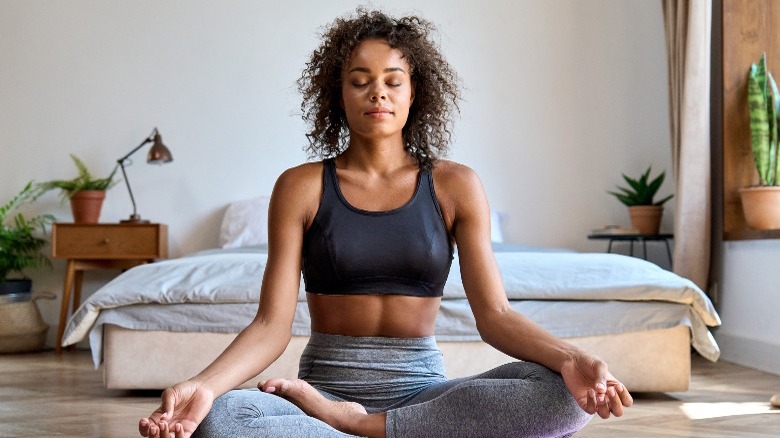What Are The Benefits Of Sleep Meditation?
Despite its roots in ancient times, the practice of meditation has been researched for its physiological effects on modern-day people in the modern-day world. Per Psychology Today, meditation could have been practiced as long ago as 5,000 BCE. Meditation then became the subject of scientific study in the West in the 1960s, and the practice proliferated in the United States from there.
While some tend to associate meditation with Buddhism, and meditation is indeed a significant practice within the religion, other religions such as Judaism, Islam, Hinduism (considered the origin of spiritual meditation practice), and even some Christian practices each share some form of meditation. But how have ancient meditation practices transformed today? Meditation's proven benefits have now married ancient religion with modern science.
While meditation used to be considered a religious and spiritual practice, it is now being used as a contemporary (and significantly more secular) "wellness" tool (via Psych Central), a practice that studies have shown can relieve stress, balance emotions, control pain, and improve your quality of sleep, per the National Library of Medicine. And meditation has become almost synonymous with better sleep: there are tons of meditation apps on the market (via Medical News Today), and one of the most popular, Headspace, reached two million paid subscribers in 2020 (via Business of Apps). Well, then how can meditation soothe your sleep?
The benefits of mindfulness meditation
Under the umbrella of meditation, a range of specific meditation practices exist. Mindfulness meditation is one of the most prominent when it comes to sleep meditation, per Healthline. According to one 2018 study, there is evidence "that mindfulness meditation can improve sleep quality in a variety of clinical populations with sleep disturbance," for example, those with insomnia — a condition that researchers suggest affects 10 to 30% of the world population, while higher estimates suggest 50 to 60%. So what is mindfulness meditation? This kind of meditation is characterized by a focus on your breath and the sensations of breathing, and an acceptance of the thoughts that will pop into your head, per the Mayo Clinic. Difficulties sleeping can often stem from daytime stressors, whether it be a demanding job, negative self-talk, or a combination of factors, and stress releases cortisol, which can have a number of significant adverse health effects on your body after long-term exposure, per the Mayo Clinic. Meditation has been shown to curb blood cortisol levels, as one German study showed that cortisol decreased significantly after a six-month meditation program, per Neuroscience News.
Thus, meditation can have double the benefits — it can both improve your sleep so you wake up energized, and assist you in letting go of stress and thought patterns that could lead you to negativity through waking hours. Consult a doctor or health care practitioner for advice when it comes to treatment of any kind.
Trying mindfulness meditation at home
Due to the success of mindfulness meditation, several mindfulness-based therapies have been created, including mindfulness-based stress reduction (MBSR) and mindfulness-based cognitive therapy (MBCT). These kinds of therapies have been shown to "reduce anxiety and depression symptom severity in treatment-seeking individuals," according to a 2017 study by the National Library of Medicine. However, one need not seek meditation therapy to feel the benefits of meditation, unless recommended by a medical professional. A 2019 study showed that even a brief mindfulness meditation (BMM) — in this case, one, 15-minute session a day for 7 days — assisted in better emotional processing.
According to Mindful.org, they have a mindfulness meditation you can use at home. First, set a timer for however long you want to meditate. Sit in a comfortable position. Straighten your upper back to maintain an attentive posture, and let your head slightly fall toward your chest. You can choose to keep your eyes opened or closed. Then, after taking several deep breaths to get comfortable, continue your regular breathing without trying to control or force it. Instead, follow the sensations of your breath, whether it be the rise and fall of your chest, the air coming in and out of your nose, or the expanding and contracting of your stomach. If (and when) you feel yourself losing focus on your breath and following your thoughts instead, simply observe them without reacting, and gently return your attention back to your breath.


